Ministry of Health and Family Welfare
From Data to Diagnosis
Transforming Healthcare through Digitalization
प्रविष्टि तिथि:
20 JAN 2025 7:26PM by PIB Delhi
Introduction
India's healthcare landscape is undergoing a digital transformation, driven by government initiatives, policy reforms, and technological advancements. With a rapidly growing population and increasing demand for quality healthcare, digital health solutions are playing a crucial role in enhancing accessibility, affordability, and efficiency. Digital healthcare infrastructure in India is evolving to bridge the gap between urban and rural healthcare services, leveraging telemedicine, electronic health records (EHRs), and artificial intelligence (AI)-driven diagnostics.
The recent World Economic Forum (WEF) article highlights India's potential to become a global leader in digital health by building a resilient digital health ecosystem. The report emphasizes the role of public-private partnerships, the importance of interoperability, and the need for robust data governance frameworks. It underscores how India’s initiatives, such as the Ayushman Bharat Digital Mission (ABDM) and the Digital Health Incentive Scheme (DHIS), can set a global benchmark for digital healthcare transformation.
The World Economic Forum Article on India's Digital Health Potential
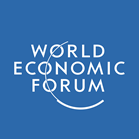
The WEF article, "India Can Be a Global Pathfinder in Digital Health," released on 15 January 2024, explores how India's digital healthcare initiatives position the country as a leader in health technology. Key takeaways from the report include:
- Interoperability and Standardization: Ensuring seamless data exchange between stakeholders.
- Public-Private Collaboration: Encouraging partnerships for innovation and expansion.
- Focus on Affordability and Accessibility: Leveraging digital tools to make healthcare inclusive.
- Global Influence: India’s digital health models could serve as templates for other developing nations.
The article acknowledges that India's digital health strategies can contribute to global health equity, improving healthcare outcomes across diverse populations. The article further acknowledges India's proactive approach to digital health, characterized by its robust digital public infrastructure and innovative private sector, positions the nation as a global leader in developing adaptable healthcare solutions. The World Economic Forum's Digital Healthcare Transformation (DHT) Initiative acknowledges India's potential to create scalable models that can be adopted worldwide, emphasizing the importance of cross-border collaboration in addressing universal healthcare challenges. This recognition underscores India's commitment to leveraging technology for equitable and efficient healthcare delivery, setting a benchmark for other nations to follow.
Digital Healthcare Infrastructure
1. Ayushman Bharat Digital Mission (ABDM)
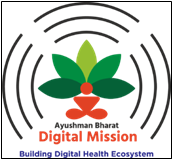
The ABDM aims to create a nationwide digital health ecosystem by integrating healthcare service providers and patients through unique health IDs. The objective of the scheme is to fill critical gaps in health infrastructure, surveillance and health research – spanning both the urban and rural areas so that the communities are Atma Nirbhar in managing such pandemic/ health crisis. Key features of ABDM include:
- Health ID: A unique identifier for individuals to store and share medical records.
- Healthcare Professionals Registry (HPR): A comprehensive database of registered healthcare professionals.
- Health Facility Registry (HFR): A digital repository of healthcare facilities across India.
- Unified Health Interface (UHI): An open network facilitating digital health services.
Over two lakh Ayushman Arogya Mandirs have been established across the country to facilitate early diagnosis and treatment. These Arogya Mandirs enable crores of citizens to easily check for diseases like cancer, hypertension, and diabetes.

The Mission, further, provides for assisted and offline mode for creation of Ayushman Bharat Health Account (ABHA) for areas with limited internet connectivity or hardware or both. As on January 20, 2025, more than 73 crore Ayushman Bharat Health Accounts (ABHA) have been created successfully and there are more than 5 lakh health professionals registered. Uttar Pradesh, Rajasthan, Maharashtra, Madhya Pradesh and Gujarat are the top 5 states with Ayushman Bharat account holders. 49.15% of the total number of beneficiaries are women.
Recently, in September 2024, the National Health Authority (NHA) and IIT Kanpur signed a Memorandum of Understanding (MoU), under which a federated learning platform across a variety of machine learning model pipelines, a quality-preserving database, an open benchmarking platform for comparing & validating AI models, and a consent management system for research under ABDM would be developed by IIT Kanpur. The platform will subsequently be operated and governed by NHA, thereby unlocking the immense potential of AI for improving health outcomes.
Introduced under ABDM, the Digital Health Incentive Scheme (DHIS) encourages healthcare providers to adopt digital health solutions by offering financial incentives for integrating digital health records and services. The scheme incentivizes hospitals, clinics, and healthcare startups to embrace digital technologies, accelerating the transition to a paperless healthcare system.
2. Telemedicine and e-Sanjeevani

India has witnessed a surge in telemedicine services, particularly during the COVID-19 pandemic. The e-Sanjeevani platform, launched by the Ministry of Health and Family Welfare (MoHFW), enables remote consultations, reducing the burden on physical healthcare facilities. The platform consists of two modules:
- e-Sanjeevani OPD: Facilitating doctor-to-patient consultations remotely.
- e-Sanjeevani AB-HWC: Connecting Health and Wellness Centers (HWCs) with specialist doctors for better healthcare accessibility in remote areas.
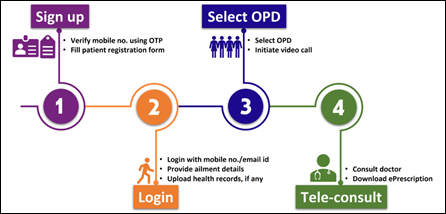
3. U-Win Portal
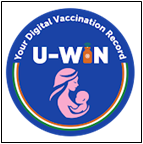
The U-WIN Portal, launched in October 2024, is developed for the complete digitization of vaccination services, and maintaining vaccination records for pregnant women and children from birth to 17 years under the Universal Immunization Programme. The citizen-centric services of the digital platform include ‘Anytime Access’ and ‘Anywhere’ vaccination services, self-registration by citizens using the U-WIN web-portal or the U-WIN citizen mobile application, automated SMS alerts, universal QR-based e-Vaccination Certificate and utility to create their Ayushman Bharat Health Account (ABHA) ID for themselves and Child ABHA ID for their children. The portal is available in 11 regional languages, including Hindi. By November 2024, 7.43 crore beneficiaries have been registered, 1.26 crore vaccination sessions have been held and 27.77 crore administered vaccine doses have been recorded on U-WIN.
4. Aarogya Setu App

Aarogya Setu has been transformed into a National Health App, bringing a whole plethora of digital health services powered by the ABDM. Using Aarogya Setu, one can register for an Ayushman Bharat Health Account and leverage it for interaction with participating healthcare providers, and allows one to receive digital lab reports, prescriptions and diagnosis seamlessly from verified healthcare professionals and health service providers. Aarogya Setu also helps one to schedule online doctor appointments powered by e-Sanjeevani OPD Application. One can schedule doctor appointments and consult with a doctor from the comfort of one’s home. Using Aarogya Setu, one can also download the Covid19 vaccination certificate or can request changes in the certificate.
5. e-Hospital
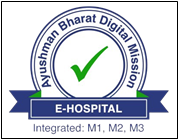
As part of the Digital India initiative of the Ministry of Electronics and Information Technology, e-Hospital, e-BloodBank and Online Registration System (ORS) applications were developed. The e-Hospital application is a Hospital Management Information System (HMIS) for internal workflows and processes of hospitals. This one-stop solution helps in connecting patients, hospitals and doctors on a single digital platform. e-Hospital is made available to Central Government/ State Government/ Autonomous/ Cooperative hospitals on the cloud through the SaaS (Software as a Service) model.
The e-BloodBank application facilitates the implementation of a complete blood bank management system. Online Registration System (ORS) is a Digital India initiative that aims to provide online access to hospital services for patients, integrated with the Ayushman Bharat Health Account.
6. National Tele Mental Health Programme (Tele MANAS)

The Government has launched a “National Tele Mental Health Programme” on 10th October, 2022, to further improve access to quality mental health counselling and care services in the country. As on January 20, 2025, 36 States/ UTs have set up 53 Tele MANAS Cells and have started tele mental health services. More than 17.6 lakh calls have been handled on the helpline number.
Key Policies Shaping Digital Healthcare
1. National Health Policy (NHP) 2017
NHP 2017 emphasizes the use of digital technology to enhance healthcare delivery. It advocates for electronic health records, health information systems, and telemedicine to improve accessibility and efficiency. It also aims to integrate digital health solutions within the national healthcare framework to address gaps in service delivery, particularly in rural and underserved regions.
2. National Health Mission (NHM)
NHM is a program that works to achieve the goals of the NHP. NHM provides support for improvement in health infrastructure, availability of adequate human resources in health facilities, to improve availability and accessibility to quality health care especially for the underserved and marginalized groups in rural areas. This Ministry provides technical and financial support to the States/UTs to strengthen the public healthcare system, based on the proposals received in the form of Programme Implementation Plans (PIPs) under NHM.
3. Health Data Management Policy
A critical component of ABDM, this policy outlines data privacy, security, and governance standards for digital health records. It ensures patient consent, data anonymization, and secure data exchange. The policy enforces strict protocols on the use and sharing of sensitive health information, ensuring that all stakeholders, including healthcare providers, insurance firms, and government agencies, comply with uniform data protection measures.
4. National Digital Health Mission (NDHM)
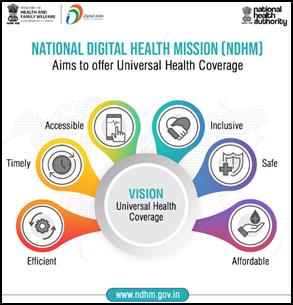
NDHM aims to make India Atma Nirbhar in providing universal health coverage to all the citizens in the country. It aligns with the goals and objectives of the National Health Policy (NHP) 2017 and the National Digital Health Blueprint (NDHB) to create a digital infrastructure for providing healthcare services across the country. NDHB serves as a strategic roadmap for achieving universal health coverage through digital health integration. It provides a structured approach to interoperability, cybersecurity, and data exchange mechanisms to ensure a robust digital healthcare ecosystem. NDHM envisions a national digital health ecosystem in India which supports universal health coverage that is efficient, accessible, inclusive, affordable, timely and safe. This digital infrastructure would consist of large amounts of health-related data and various standardised digital services while ensuring strict confidentiality and security of personal information of the public.
NDHM will implement the following digital systems across the country:
- Health ID: Implementation of a Unique Health ID (UHID) just like an Aadhaar ID to identify and authenticate an individual based on past health records.
- Digi Doctor: A repository of doctors with individual details like name, institution, qualification, specialization and years of experience among other necessary details.
- Health Facility Register (HFR): A repository of Health Facilities across the country. HFR will be centrally maintained and facilitate standardised data exchange of private and public health facilities in India.
- Personal Health Records (PHR): A PHR is an electronic record of an individual which would contain health-related information of that individual.
- Electronic Medical Records (EMR): An app that contains medical and treatment history of a patient. EMR is envisaged to be a web-based system that would contain comprehensive health related information of a patient at a facility.
5. Pradhan Mantri Ayushman Bharat Health Infrastructure Mission (PM-ABHIM)
PM-ABHIM focuses on strengthening primary, secondary, and tertiary healthcare infrastructure, integrating digital health technologies to improve service delivery. This initiative aims to develop robust public health laboratories, bolster emergency response capacities, and enhance medical research through digital databases. It is the largest Pan-India scheme for public health infrastructure since 2005.
Conclusion
India’s digital healthcare transformation holds immense potential to enhance healthcare accessibility and efficiency. With continued policy support, infrastructure development, and public-private collaborations, the country is poised to emerge as a global leader in digital health. Future focus areas include AI-driven diagnostics, blockchain-based health records, and enhanced cybersecurity frameworks.
The Indian government’s proactive approach toward digital healthcare infrastructure and policies is shaping a more efficient and accessible healthcare system. With growing investments in digital health and technological advancements, India's healthcare system is expected to evolve into a globally recognized model for digital transformation, setting benchmarks for other developing nations.
References
https://www.weforum.org/stories/2025/01/india-can-be-a-global-pathfinder-in-digital-health-here-s-how/
https://pib.gov.in/PressReleasePage.aspx?PRID=2069177
https://pib.gov.in/PressNoteDetails.aspx?NoteId=153215
https://pib.gov.in/PressReleasePage.aspx?PRID=2079025
https://esanjeevani.mohfw.gov.in/#/
https://mohfw.gov.in/sites/default/files/Note%2Bon%2BPMABHIMM%2B%28Annexure-1%29-1.pdf
https://sansad.in/getFile/loksabhaquestions/annex/183/AU4291_iZ4rnu.pdf?source=pqals
https://telemanas.mohfw.gov.in/telemanas-dashboard/#/
https://abdm.gov.in:8081/uploads/Accelerating_Digitisation_in_Healthcare_Delivery_v3_fad6fe700f.pdf
https://sansad.in/getFile/loksabhaquestions/annex/183/AU4290_2fN0re.pdf?source=pqals
https://sansad.in/getFile/loksabhaquestions/annex/183/AU1848_XZjLC3.pdf?source=pqals
https://abdm.gov.in:8081/uploads/Digital_Health_Incentive_Scheme_3c3766a182.pdf
https://pib.gov.in/PressReleasePage.aspx?PRID=2053721
https://pib.gov.in/PressNoteDetails.aspx?NoteId=151782&ModuleId=3®=3&lang=1
https://abdm.gov.in/
https://dashboard.abdm.gov.in/abdm/
https://www.makeinindia.com/national-digital-health-mission
https://www.facebook.com/OfficialDigitalIndia/photos/digitalhealthcare-the-ministry-of-health-and-family-welfare-government-of-india-/4163426657026778/
Click here to download PDF
******
Santosh Kumar/ Sarla Meena/Gouri S/ Rishita Aggarwal
(रिलीज़ आईडी: 2094604)
आगंतुक पटल : 12231